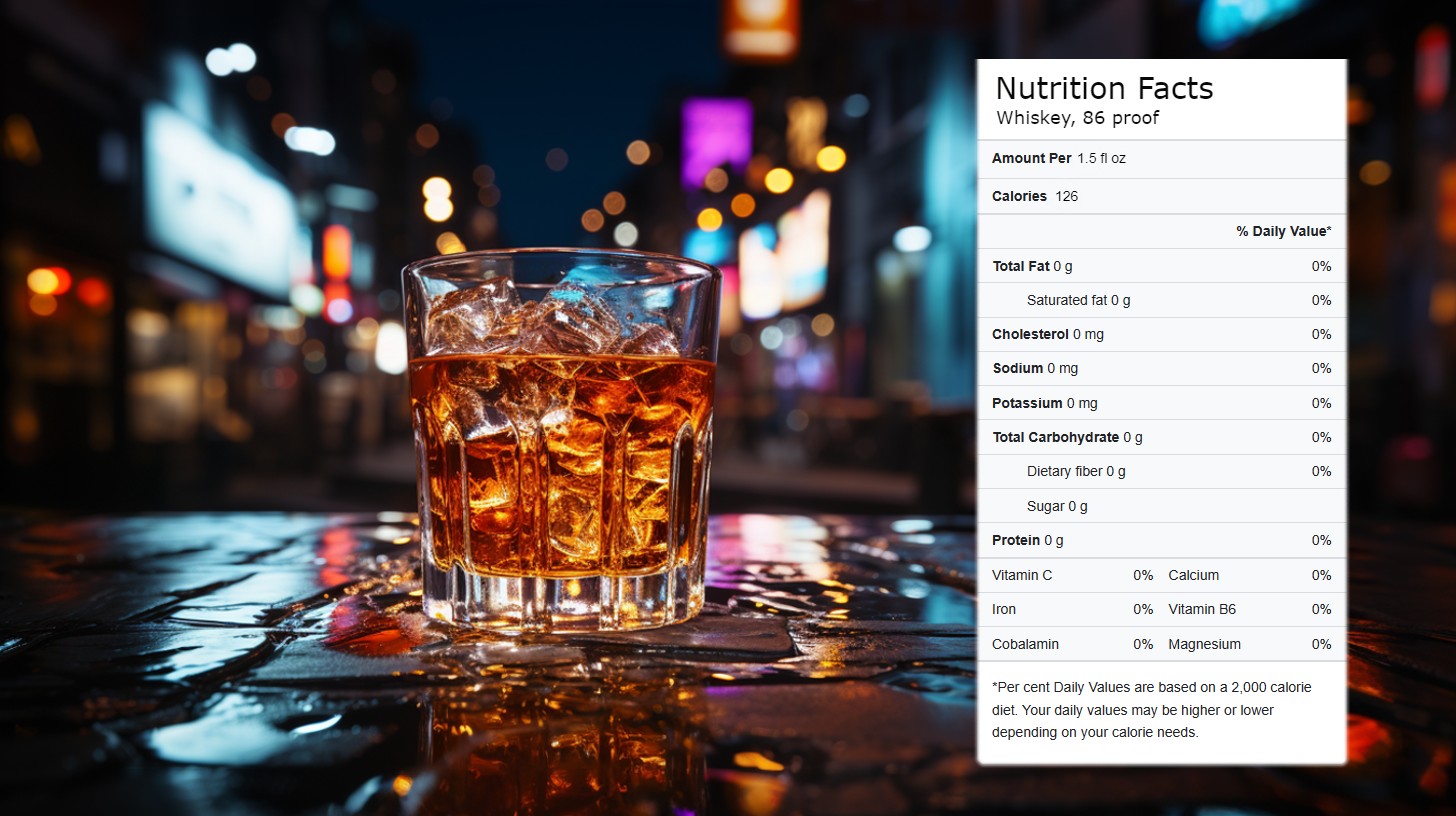When it comes to spirits that have captured the hearts and souls of generations, whiskey stands out as a timeless classic. It’s rich and complex, and can be enjoyed in myriad ways—from neat sips to sophisticated cocktails. But, in the age of wellness and health consciousness, the inevitable questions arise: “How many calories are in a shot of whiskey?” or “How many carbs does whiskey contain?” 🥃
In this comprehensive guide, we aim to answer these questions and more. Whether you’re a fitness enthusiast who loves an occasional drink or someone just curious about what goes into your favorite spirit, we’ve got you covered. We will explore the nutritional profile of whiskey, focusing on calories, carbs, and other nutritional aspects you should be aware of. Sit back, pour yourself a responsible glass, and let’s dive in!
The Caloric Content in Whiskey
Let’s start with the most frequently asked question: “How many calories are in whiskey?” Generally, a standard shot of whiskey (1.5 oz) contains around 96 calories. It’s worth mentioning that this count may vary slightly depending on the brand and proof of the whiskey. Unlike beer or wine, whiskey is distilled and hence contains no sugars or carbs, which makes it a lower-calorie option for those watching their intake.
The Math Behind Calories in Whiskey

Ever wondered how these calorie numbers are calculated? Here’s the lowdown. According to USDA, one gram of 86-proof whiskey provides about 3 calories. Given that an average shot of whiskey usually contains 1.5 fl oz, meaning about 42 grams, we can calculate the caloric content:
42 grams X 3 calories/gram = 126 calories
However, calories also depend on the proof, which is double the percentage of alcohol by volume in the beverage. A higher proof will mean more calories, and vice versa.
Proof and Caloric Content
Higher-proof whiskeys will generally pack more calories. For instance, a shot of 100-proof whiskey would contain around 110 calories.
The Calorie Count of Flavored Whiskeys
Flavored whiskeys may contain additional calories due to added sugar and flavorings. Always check the nutrition label when available.
Carbohydrates in Whiskey: Zero Carbs, Zero Worries
One of the best things about whiskey is that it contains zero carbs. That’s right—no carbs whatsoever. This makes it an ideal choice for those on a low-carb or keto diet. However, be mindful of mixers and chasers, as they can quickly turn your carb-free drink into a sugar-laden cocktail.
The Caveats: Mixers and Cocktails
While whiskey itself is carb-free, the devil is in the details—or in this case, the mixers. Popular cocktails like whiskey sours or Old Fashioneds include sugar syrups and fruit juices, which can significantly increase the carb count.
Cocktails to Avoid for Low-Carb Diets
If you’re watching your carbs, steer clear of cocktails that use sweet mixers like soda or pre-made syrups.
“On the Rocks” or Neat
When it comes to enjoying whiskey in its most unadulterated form, two options often come to the forefront: “on the rocks” and neat. Both methods allow the drinker to savor the intricate flavors and aromas of the spirit without any mixers or additional elements that might dilute or alter its character. Understanding the distinctions between these two classic serving styles can enhance your whiskey experience.
Other Nutritional Components

- Protein: Whiskey contains negligible amounts of protein.
- Fats: Whiskey is also free from fats.
- Vitamins and Minerals: There are no vitamins or minerals to speak of in whiskey.
- Sugars: As mentioned earlier, whiskey contains no sugars unless flavored or mixed.
Protein in Whiskey
When it comes to protein, whiskey doesn’t have much to offer. The distillation process it undergoes eliminates most of its protein content. Thus, if you’re looking to up your protein intake for the day, whiskey won’t be the source to rely on. For those who are bodybuilding or are on a high-protein diet, this means whiskey won’t contribute to your daily protein needs.
Fats in Whiskey
Whiskey is also fat-free, making it an option for those who are monitoring their fat intake. The lack of fats in whiskey is due to its distillation process, which removes these elements from the final product. This means that those on low-fat diets can consume whiskey without worrying about additional fat calories, although moderation is key, of course.
Vitamins and Minerals
If you’re seeking to get your daily dose of vitamins and minerals, whiskey is not the beverage to turn to. It contains virtually no vitamins or minerals. Unlike fruits, vegetables, or even some beers that contain trace amounts of nutrients like potassium or Vitamin B, whiskey lacks these beneficial components.
Sugars in Whiskey
While whiskey is carb-free, it’s worth repeating that it also contains no sugars—unless it’s flavored or mixed. This can be a significant factor for those watching their sugar intake for health reasons, such as diabetes. However, adding mixers or opting for a flavored variant can significantly alter the sugar content, so always read the label or make your cocktails at home to control the ingredients.
By taking the time to fully understand the nutritional aspects of whiskey, you are not just enjoying a beloved beverage but doing so in a way that aligns with your health and dietary goals. Cheers to that! 🥃
Health Implications of Consuming Whiskey

Potential Benefits
While whiskey is by no means a health drink, moderate consumption has been linked to certain health benefits. Some studies suggest that it may improve heart health and even help regulate blood sugar levels to some extent. However, these claims are still under investigation, and it’s crucial to consult healthcare professionals for personalized advice.
Health Risks
Excessive consumption of whiskey, or any alcohol, can lead to a myriad of health issues, ranging from liver disease to an increased risk of certain cancers. Not to mention, the added caloric intake can contribute to weight gain, which comes with its own set of health problems. Moderation is key.
Responsible Drinking
Always drink responsibly. The Centers for Disease Control and Prevention recommend up to one drink per day for women and two drinks for men as moderate drinking.
When to Avoid Whiskey
Pregnant women, people with certain medical conditions, and those taking specific medications should avoid alcohol consumption altogether.
Whiskey—A Toast to Knowledge and Moderation

So, there you have it—a complete guide to the nutritional profile of whiskey. While it’s relatively low in calories and devoid of carbs, moderation remains the key to enjoying whiskey without adverse health impacts. The next time you’re enjoying a glass, you can do so with a better understanding of what you’re consuming.
Thank you for taking the time to read our guide on whiskey nutrition facts. If you’re looking to buy quality whiskey, whether international or local brands, we invite you to visit Zipps Liquor. Honored as the Retailer Of The Year in Texas by ABL, Zipps Liquor offers a wide array of beer, wine, spirits, and mixers at great prices. Shop online and choose between pickup and delivery, or visit your nearby liquor store in Texas to buy all your favorite beverages. 🛒
Cheers to making informed choices!









